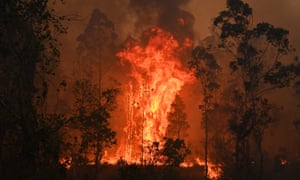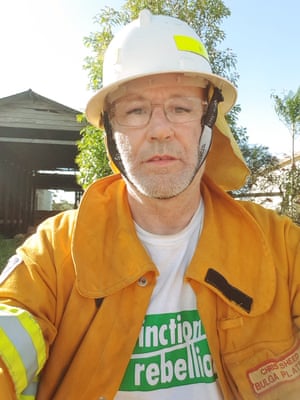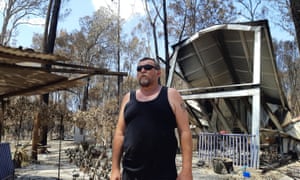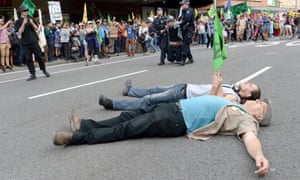
Chris Sheed is as far from Michael McCormack’s vision of ‘woke capital-city greenies’ as you can get
by Christine Tondorf
by Christine Tondorf
On Friday 8 November – the day some 150 properties were lost and four
people died in New South Wales – Chris Sheed was on the frontline.
He drove through the town of Bobin, just a few kilometres south of his home in the small village of Elands, on his way back from work. The next morning, he boarded the Bulga Plateau fire truck and spent the day trying to save the properties of friends.
“These fires have been one of the most intense and traumatic events of my life,” he says. “I witnessed the destruction of the village of Bobin. That was our first assignment and I have a large number of friends in Bobin, whose properties were destroyed.”
On the Saturday and Sunday, the fire came right to his backdoor.
This year’s fires are the worst he has ever witnessed.

He drove through the town of Bobin, just a few kilometres south of his home in the small village of Elands, on his way back from work. The next morning, he boarded the Bulga Plateau fire truck and spent the day trying to save the properties of friends.
“These fires have been one of the most intense and traumatic events of my life,” he says. “I witnessed the destruction of the village of Bobin. That was our first assignment and I have a large number of friends in Bobin, whose properties were destroyed.”
On the Saturday and Sunday, the fire came right to his backdoor.
‘This is the time’
Sheed has lived in the area for the past 38 years, calling Elands home, about 50km north of Taree.This year’s fires are the worst he has ever witnessed.

“I don’t think you could publish what I would like to say but I think he is so far wide of the mark. He is just displaying the most gross ignorance.”
Sheed is also unimpressed with the NSW premier, Gladys Berejiklian, who answered “not today” when she was asked about climate change at a press conference on the bushfires.
“If not ‘today’ then when?” he says. “This is the time to face the issue and talk about it. This is the time when emergency service leaders are talking about it. It is the time when anyone who accepts the basic science of climate change wants the government to talk about it.”
Not only does Sheed say that the fires he has been battling in the region for weeks have been made worse by climate change, he has joined the activist group Extinction Rebellion and has been arrested taking part in a demonstration.
The Extinction Rebellion movement has a stated aim of using non-violent civil disobedience to compel government to address climate change, but its use of these tactics has been controversial. The Queensland government has introduced laws to crack down on protests, which have been criticised as draconian and anti-democratic.
Occasionally Sheed wears his Extinction Rebellion T-shirt under his RFS yellow protective suit. He feels that his involvement with the movement has wide community support.
“About 150 people live on the Bulga Plateau, half are traditional farmers and the other half could be described as ‘alternative’ and I believe more than 50% back me.”
Doug Wood, a former RFS deputy group captain, who lost his house south of Lismore to the flames while helping his neighbours and parents save theirs, was also unimpressed by the rhetoric coming from politicians.
Wood was at home on a rural acreage with his wife, 26-year-old son, and 27-year-old daughter, and his daughter’s three small children when he first smelled smoke at 2.55pm on Friday 8 November.

“Within minutes we spotted a huge plume of smoke,” he says. “The fire was behind us. We had a little tanker on the back of my four-wheel drive and my wife, son and I jumped in.”
They headed off to defend the homes of his parents, brother and neighbour. There are only five houses in the street.
“That’s when we realised it was coming up too quick. So we turned around and had only about 1.5km to travel back to our place but, by the time we got up there, the whole place was on fire, everything was on fire.
“We did save my parents’ house and the bloke’s place across the road.”
Morrison’s ‘cop-out’
At a news conference following the blaze that destroyed Wood’s house and another 150 homes, the prime minister, Scott Morrison, refused to discuss climate change.Instead, he told the assembled journalists he was focused on “the needs of the people in this room today … the needs of resourcing our firefighters and to ensure they have everything they need to keep those firefighter safe and to protect as many properties as possible.
“One of the stories I’ve heard is that you have firefighters out there saving someone else’s house when their own house is burning down. When we are in that sort of situation, that’s where our attention must be.”

Wood disagrees.
“I think that is a cop out. The government needs to address climate change now. They should have already been doing it. They need to stop hiding.”
Wood says the prime minister’s focus should not be solely on the heroics of firefighters or the immediate needs of those affected. Instead, he says, proper climate change policies are needed.
“They need to take action … climate change is true and we need to clean it up,” Wood says. “The fire here was so intense because it is so dry and the only thing that has made it this dry is climate change. The climate is changing. Slowly but surely, it is killing us. I have two dams on my property and they have been empty for at least 12 months.”
Wood will rebuild his house and hopes to find a caravan or cabin for his family to live in during the coming months. He is expecting a long bushfire season in northern New South Wales.
“We normally have our fires in the spring, then the summer rains and storms stop the fires, but they are not coming. There is no rain forecast.”
No comments:
Post a Comment